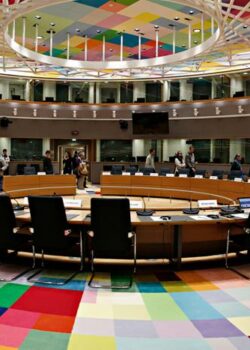This month (February), members of the European Council decided to extend deliberation on the final text of the Corporate Sustainability Due Diligence Directive (CSDDD), thus delaying and potentially derailing new rules intended to compel affirmative corporate action against environmental and human rights abuses in global value chains.
This means the matter will not be considered by the European Parliament unless the Council votes affirmatively. With the European Parliament elections scheduled this June, a lengthy delay stands to significantly impact the trajectory of the law. While, ideally, this directive will be ratified, it is in some ways beside the point, especially considering overwhelming and growing public support of its cause.
Whether to comply with eventual law or to maintain relevance and strength in the emerging green economy, corporate boards should take actions now to position their institutions to build and improve meaningful and effective dialogue with local communities impacted by business-supported activities. If done right, business will be stronger for it.
Included in the CSDDD and similar (already ratified) initiatives is a requirement that companies establish or join effective grievance redress mechanisms. As an advocate for people who have used non-judicial grievance mechanisms to both prevent harm from manifesting and to seek accountability if and when it does, I can tell you that they can be incredibly powerful good governance tools.
It’s crucial for boards to ask whether their executive teams have effective channels to proactively hear from people affected by the business – and anything but an unequivocal “yes” is cause for concern.
Community knowledge
Establishing direct lines of communication with communities vis-à-vis effective grievance mechanisms is not only essential to manage risks to enterprise value, but also to optimise investment dollars and ensure progress toward sustainability targets. The information received through these channels can provide insight on environmental and social performance, and helps identify and efficiently address financial, legal, and reputational risks.
For example, communities we have worked with have relied on such mechanisms to raise concerns about hidden labour abuses, project mismanagement, and other serious rights violations in order to provide opportunities to companies and their investors to remedy harm and avoid the costs of non-action.
Companies that have chosen to distance and disengage from—rather than meaningfully respond to—grievances ultimately have been confronted with legal challenges and negative publicity detrimental to corporate morale and public standing alike.
Moreover, effective grievance redress mechanisms can help businesses hold themselves accountable to climate, biodiversity and other sustainability commitments premised on our ‘planetary boundaries’.
Both the Taskforce on Nature-related Financial Disclosures and the Science-Based Targets Initiative—which are premiere frameworks intended to guide corporate responsibility over environmental impacts—have determined that grievance mechanisms are critical to evaluate and course-correct unintended impacts that compromise performance on sustainability commitments.
Without grievance redress processes, companies risk ignoring expertise from Indigenous Peoples and local communities possessing experiential knowledge and intimate familiarity with on-the-ground impacts. These have high relevance to the implementation of climate and biodiversity transition plans implored by the Paris Climate Agreement and Kunming-Montreal Global Biodiversity Framework, and which may one day become mandatory under the CSDDD.
Complaints and compliance
Regardless of whether the CSDDD becomes official law, companies would also be wise to create grievance mechanisms to maintain relevance and good standing in the present paradigm of corporate responsibility.
The CSDDD merely attempts to promote cohesion of laws intended to foster transparency of sustainability risks and impacts (see the EU’s Sustainable Finance Disclosure Regulation and Corporate Sustainability Reporting Directive) and to prohibit contribution to harms such as global deforestation and conflict minerals.
Aspects of human rights due diligence can also be found in laws promulgated by Germany, France, and Norway, to name a few, a notably strong piece of proposed legislation in South Korea, and significant policy developments out of China.
These advancements reflect international consensus apparent in the OECD’s recently updated Guidelines for Multinational Enterprises on Responsible Business Conduct, as well as sustainability reporting standards proliferated by influential entities, including the Global Reporting Initiative, SDG Impact, and the International Sustainability Standards Board.
Common among all are expectations that companies and investors report on the existence and use of their grievance redress mechanisms, as well as on their policies for providing or cooperating in remedying adverse impacts to external stakeholders affected by their operations.
It would be easy, but meaningless, to comply with these standards and laws by creating a check-the-box grievance mechanism that is not actually effective. Instead, boards need to act with intention to ensure that the mechanisms are designed in such a way that affected communities will use them.
Be prepared
Whether the company you govern aims to prepare for the eventuality of mandatory human rights due diligence, follow existing guidelines and regulations, or embrace best practice in corporate sustainability, here are the steps companies need to take to mitigate and manage environmental and social risks:
1. Ensure the grievance mechanism is accessible.
For a grievance mechanism to be effective, it must be used; to be used, its intended stakeholders must know about it. Consider ways of publicising and promoting the mechanism to the very people affected by your business, and accommodate for potential barriers to access, for example, language or technology. Do away with overly burdensome grievance eligibility requirements that risk filtering out potentially consequential complaints.
2. Make it predictable.
The perceived legitimacy of a grievance mechanism also bears on the willingness of stakeholders to use it. Transparency of process is therefore critical to set expectations and encourage use. Clarify and publish your grievance handling procedures and timelines for response to assure potential users that their concerns will be treated seriously.
3. Maintain independence.
Creating distance between grievance redress and business activity is necessary to avoid conflicts of interests and to promote trust and constructive dialogue with external stakeholders. Stakeholders must be confident that your grievance mechanisms will be used to resolve—not cover up—problems, and they will never raise the concerns you will want to know about if they fear retaliation against speaking up. Ensure the integrity and effective use of your grievance mechanisms by designing and positioning them to be independent and allowing them to report directly to the board on matters related to institutional accountability.
4. Respond to what you hear.
A grievance mechanism’s purpose is not to simply hear about issues, but also to resolve them. Your company must be prepared to remedy harm unearthed through the grievance process. Or else, what’s the point?
5. Embrace transparency for the sake of stakeholder trust and efficient reporting.
Maintaining a complaints registry for stakeholders to track and verify that your company is engaging meaningfully with grievances will help to bolster the perceived legitimacy of your grievance mechanisms, with the additional benefit of helping to streamline reporting on grievance redress per sustainability reporting laws and guidelines.
In the sustainability-focused sector of development finance, a focus of our advocacy at Accountability Counsel, these steps have proved instrumental in supporting organisations to achieve positive environmental and social impacts.
If approached authentically, grievance mechanisms can benefit shareholder trust, public reputation, sustainability and value. Even setting aside the prospect of administrative penalties and civil liability under the CSDDD, corporate boards should seriously consider how to underpin environmental and social due diligence requirements with effective grievance mechanisms in the interest of shareholders and stakeholders alike.
Gregory Berry is a policy associate at advocacy and civil society organisation Accountability Counsel





